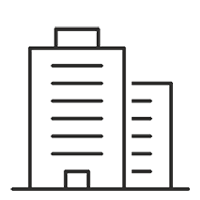Mortgages in Dubai
Although a large proportion of real estate property in Dubai is transferred on the basis of cash, financial institutions in Dubai do offer mortgages. Mortgages can be created over real estate in Dubai in favor of UAE-licensed banks and financial institutions and must be registered at the Dubai Land Department (DLD).
Can Non-UAE Residents Get Mortgages to Purchase Property in the UAE?
Nonresident foreign investors can certainly get a mortgage in the UAE, however, compared to UAE citizens and residents, they have much-limited options.
The UAE Mortgage Cap law requires non-UAE residents to make a down payment of at least 20% of the property value plus associated purchase costs. This goes up to 35% (30% for UAE nationals) plus costs for properties above AED 5 million. And if they are buying their second or third property, they will need at least 40% of the property value to cover the down payment.
The Process for Buying Ready Property
The procedures for purchasing real estate in Dubai are straightforward for the most part. First buyer and seller agree on terms, this can be done with or without the assistance of a real estate broker or solicitor. The process will differ depending on whether the buyer is purchasing with cash or a mortgage, and if the property has a mortgage against it.
- If the buyer is purchasing with the aid of a mortgage then the bank’s involvement will of course be required.
- An Agreement of Sale or MOU (Memorandum of Understanding) is signed and a deposit (usually 10%) is paid.
- The parties meet at the offices of the developer to apply for a No Objection Certificate (“NOC”) to transfer. Once the NOC is issued, the parties are free to attend at the offices of the Dubai Land Department to effect the transfer of ownership.
- If the seller has an existing mortgage over the property then there will be more steps involved and the procedure is more complicated as the buyer will be required to settle the seller’s mortgage in full prior to the NOC application.
- In most cases, whether it is a developer or a real estate agent, two to five percent of the selling price is expected to be paid in addition to the price of the property.
- To purchase real estate in Dubai, the buyer must be over 21 years old.
Mortgage Transactions
Cash Buyer and Mortgaged Property
When there is an existing mortgage on the property, the loan must be settled before transfer to the buyer. To do so, the seller needs to approach his bank requesting a Liability Letter. This letter states the balance of the loan, as well as any fees and penalties. Depending on the bank the validity period of this liability letter ranges from 7-15 days. The next step needs the seller to apply for a No Objection Certificate (NOC) from the property developer. This is to ensure that there are no outstanding payments for service charges to the developer.
Once the liability letter is issued, there is another process known as ‘property blocking’ which is mainly to protect the buyer. The buyer, the seller, and other parties will need to visit one of the Dubai Land Department (DLD) registration trustee’s offices in order to block the property in the buyer’s name. This will allow the buyer to settle the mortgage while ensuring that the seller cannot transfer the property to another person, or change the terms of the agreement.
The next step in buying mortgaged property in Dubai is to deliver the buyer’s cheque to the bank. Once the mortgage has been cleared, the bank will issue the clearance letter and the original title deed to the seller. The final step requires both parties to visit the DLD registration trustee’s office for the transfer of ownership.
Mortgage Buyer and Mortgage-Free Property
Anyone who wants to buy property on a mortgage needs to get a preapproval. This mortgage pre-approval letter is an official document issued by the respective bank as evidence of the buyer’s eligibility for obtaining housing finance. The letter of pre-approval can provide buyers and brokers with an idea of the price range. It will also make the sellers take the offer more seriously.
After finding the property, the buyer can reach out to the bank in order to finalize the home loan agreement. The bank will conduct a valuation or appraisal of the property’s value to gauge the value of the property and also assist in making a good offer on it.
Then the parties have to sign the contract and hand over the deposit and decide on a completion date for the purchase transaction. On the final day of property transfer, the bank will release the loan amount to the seller.
Mortgage for an Off-plan or Ready Property
- You have to finance 50% of the off-plan property value using your funds. If you approach a bank, you can lend up to 50% against the value of the off-plan property.
- This percentage is known as the loan to value ratio. It means that if the property being purchased is say, AED 1,000,000, the maximum amount the bank will lend against that property is AED 500,000 or 50% for an off-plan purchase and the percentage will be 75% for a ready property.
- This applies to both UAE nationals as well as expats.
- Banks offer applicants who are non-residents with mortgages with an interest rate of about 4.50%. It is a fixed interest rate, calculated using a 3-month EIBOR rate.
- If more than one application for a mortgage is submitted for the same property at the same time, creditors will be classified and mortgages will be given according to the individual’s credit score.
- When you register with the DLD, then it will issue a written or electronic mortgage document and the mortgage will be enforceable against third parties.
Other points to consider:
- When purchasing a property in the UAE, additional costs associated with a real estate transaction must also be taken into account, such as the cost of an appraisal of the property, the real estate commission, the transfer of land and the registration fee for the mortgage.
- In Dubai, the buyer and seller must meet with the Dubai Department of the Land or fiduciary of the property to register the transfer of title.
- There are several different protocols, depending on whether you are buying a property from a developer, called an "off-plan" purchase, or whether you are buying a property from a private seller called a "resale" purchase.
- If you are buying from a secondary market, it is highly recommended to consult a licensed real estate agent for each real estate transaction.
The Process for Buying off-plan Property
- The buyer has to finance 50 percent of the off-plan purchase.
- The developer will ask the buyer to sign a Sale Purchase Agreement and pay the deposit.
- When the off-plan project is ready, the buyer has to pay the rest of the 50 percent. The payments will depend on the payment plan mentioned in the contract.
- Depending on the developer’s offer, the buyer may have to pay the registration fee fully, which will amount up to 4% of the purchase price.
Which Banks Will Finance an Off-plan Property Purchase?
When it comes to off-plan properties the number of options for obtaining a mortgage is limited. This is mainly because banks set conditions on which type of off-plan properties and projects they finance. In general, banks mainly approve a mortgage for properties that belong to the master developers like Emaar Properties and rarely approve loans for private developers' projects.
Down Payment Requirements for Non-UAE Nationals (Expats and Nonresidents)
| Purchase Type | Purchase Price | Maximum loan-to-value ratio (LTV) | Minimum down payment |
|---|---|---|---|
| First property | Under AED 5 million | 75% | 25% |
| First property | Over AED 5 million | 65% | 35% |
| Second, third + property | Any price | 60% | 40% |
| Off plan / under construction | Any price | 50% | 50% |






























